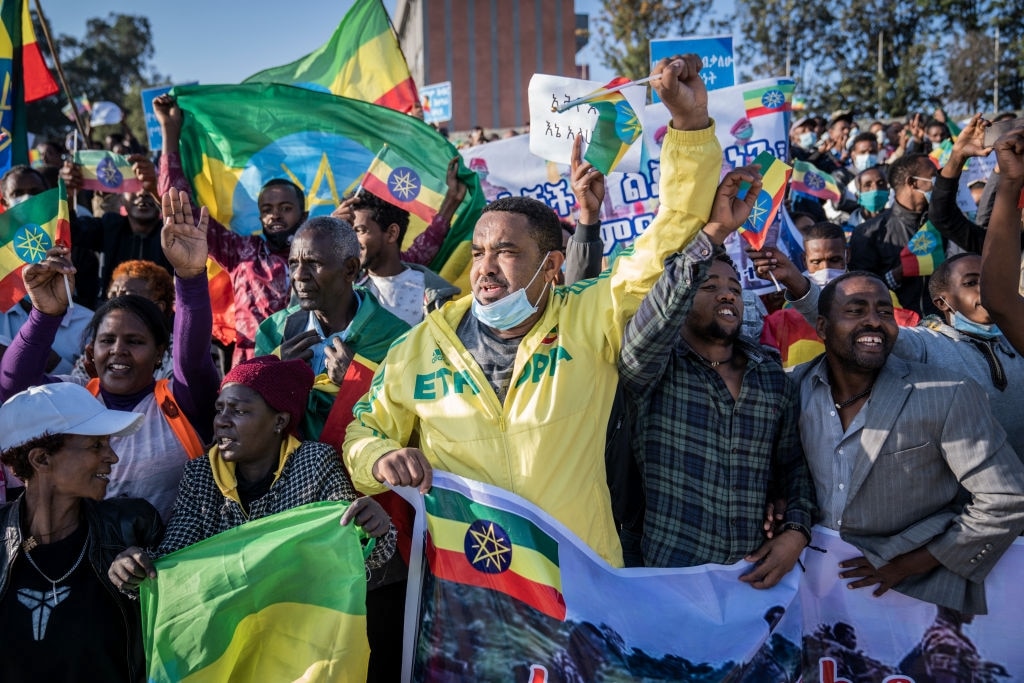Share
08 November 2021 Jaal Maroo, commander of the Oromo liberation army (Ola) - an armed formation allied with the Tigray People's Liberation Front - warned that his troops are "only 40 kilometers" from Addis Ababa, the capital of Ethiopia, and he predicted that the civil war in the country will end "very soon". "We are preparing for another attack. The government is just trying to buy time," Maroo said. The government denied the picture drawn by the commander of the Ola, but ordered Addis Ababa to prepare for the defense of the city.
Preventive arrests of rebel sympathizers are underway in the capital; in any case, they will think twice before attempting the assault on Addis Ababa, "because they are frowned upon and because the urban population is twice that of the Tigray region": local sources speak to the Dire agency. Yesterday tens of thousands of people, 100,000 according to some estimates, took part in marches and demonstrations to express their support for the federal government led by Abiy Ahmed. The prime minister, in office since 2018, awarded the Nobel Peace Prize for the reconciliation agreement signed with Eritrea after 20 years of tensions and conflicts, is experiencing his most difficult moment.
"I am deeply saddened by all that is happening in the Tigray region and in the regions beside Amhara and Afar, even though unrest has been occurring throughout the country for at least a year, now dramatically degenerate." Thus Bishop Seyoum Fransua Noel, apostolic vicar of Hosanna (a town in the south of the country), and National Director of the Pontifical Mission Societies in Ethiopia. "When there is a conflict, the victims are the poor, it is necessary that there is a dialogue between the parties to restore a social balance. War is useless, people are suffering a lot, it is necessary to seek peace and security", underlines to Agenzia Fides.
The militias of the Tigray People's Liberation Front (Tplf) took control of Dessie and Kombolcha last week, two cities believed to be strategic about 300 kilometers from Addis Ababa. According to the sources of the Dire, the situation in the capital remains calm overall. "There is no rush to stock up on gasoline or essential goods," they report. "The main concern is not about the assault, which does not seem imminent to date, but rather the capture of Kombolcha and the risk that the rebels cut the connections between Addis Ababa and Djibouti, a strategic port on the Red Sea that guarantees Ethiopia the access to international markets ".
The thesis is that the TPLF, a party rooted in a northern region on the border with Eritrea, has left a negative memory in the capital. "After being despised and marginalized in the times of Italian colonialism and having fought against the regime of Menghistu Hailé Mariam, the Tigrayans exercised power for almost 30 years with Prime Minister Meles Zenawi" the sources recall: "For their toughness and arrogance, combined with a partisan management of public affairs, made themselves hate; from being persecuted they became persecutors themselves ".
During yesterday's demonstrations, banners and slogans were displayed in favor of the unity of Ethiopia and against the offensive of the TPLF and its new allies, such as the Oromo Liberation Army (Ola). However, coverage of the conflict, which began a year ago, by some international media has also been contested. According to the demonstrators, for example, the American broadcaster CNN reported almost only the motivations of the Tigray People's Liberation Front. According to sources in Addis Ababa, "if the TPLF tried to enter the capital it would risk suffering a counter-offensive by Eritrea, which is capable of occupying the Tigrinya capital Macallè".
On Saturday, 16 countries appealed for a truce: Australia, Belgium, Canada, Denmark, Finland, France, Germany, Great Britain, Iceland, Ireland, Luxembourg, the Netherlands, New Zealand, Norway, the United States and Sweden.
According to estimates released by the United Nations, thousands were killed in a year of war.
Over two million displaced people and 400 thousand people, in Tigray alone, put at risk by a famine.

